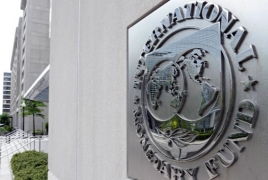IMF boosts lending for world's poorest countries by 50% July 8, 2015 - 23:37 AMT PanARMENIAN.Net - The International Monetary Fund is boosting by 50 percent its lending for the world's poorest countries as part of a revamp of its operations to help world leaders achieve their ambitious agenda for global development, Reuters reports. IMF Managing Director Christine Lagarde announced the changes on Wednesday ahead of a United Nations conference next week on how to finance development when global growth is slowing and foreign aid budgets shrinking. "This year marks a once-in-a-generation opportunity for global development," LaGarde said in a speech prepared for delivery at the Brookings Institution in Washington, according to Reuters. An estimated $2 trillion to $3 trillion in new investment is needed to achieve the United Nation's bold agenda, which world leaders are due to adopt in September. It has drawn up 17 Sustainable Development Goals on everything from ending hunger and poverty to achieving gender equality and making cities sustainable and safe by 2030. These goals, along with climate change which will come up for debate by year's end, present significant financing challenges. While the IMF's primary role is as emergency lender, Lagarde laid out a series of measures designed to support low-income countries as they pursue faster and more equitable economic development. It expanded the borrowing limit on its low-interest and interest-free loans, which 73 poor countries are eligible to receive, from 300 percent of their IMF quota to 450 percent. It also lengthened the repayment period on zero-interest loans for fragile states and countries hit by natural disasters. The IMF coupled this with organizational changes to focus more staff resource on technical advice and training in the following areas: * Taxation: Tax collection is less than 15 percent of GDP in almost half the developing countries against 34 percent in OECD countries. The IMF said it will work with developing countries on improving tax systems and would represent their interests in international talks to revamp global corporate tax rules. * Infrastructure: the World Bank estimates there is $1 trillion a year shortfall in infrastructure investment in developing countries, while IMF research shows that 30 percent of potential gains from public investment is lost. The IMF will work more closely with countries on infrastructure strategies. * Financial inclusion: The IMF will expand its analytical work on income inequality, gender, youth and access to finance for marginalized people as a means to raise GDP. "In these concrete ways, the IMF intends to create a more supportive environment for developing countries to prosper in the period ahead. We will play our part," Lagarde said. Yerevan has dismissed Turkey’s demand to shut down the Armenian nuclear power plant as “inappropriate”. Armenia will loan 2.9 billion drams to Nagorno Karabakh (Artsakh), according to a draft government decision. The Ministry of Ecology and Natural Resources of Azerbaijan has “strongly condemned” Armenia’s decision. Kerobyan has said that for the first time in the history of Armenia, the volume of foreign direct investments amounted to about $1 billion. Partner news |